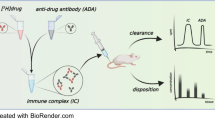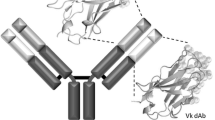Abstract
The effect of three monoclonal digoxin-specific antibodies on total and free digoxin plasma disposition was studied in rats in order to determine the role of affinity constant (Ka) and dose. Thirty minutes after digoxin infusion, administration of a stoichiometrical dose of the 1CIO, 6C9 and 9F5 IgG (Ka = 6 109, 3.1 108 and 2.5 107 M−1, respectively) resulted in a plasma digoxin increase linearly related to Ka. The mean free plasma digoxin was 0.6 ± 0.4, 7.8 ± 3.3 and 43 ± 22 % respectively after 1C10, 6C9, and 9F5 IgG infusion in comparison to 70 ± 9% in the control group. When the IgG:digoxin ratio increased from 1 to 5, plasma digoxin Cmax and AUCT also increased as a function of both affinity (Ka) and dose (N), but not linearly. The product of NKa defined an immunoreactivity factor that was well fitted to the digoxin redistribution parameters (Cmax and AUCT) by a Hill equation.
Similar content being viewed by others
REFERENCES
T. Smith, E. Haber, L. Yeatman and V.P. Butler. Reversal of advanced digoxin intoxication with Fab fragments of digoxinspecific antibodies. N. Engl. J. Med. 294: 797–800 (1976).
A.R. Hickey, T.L. Wenger, V.P. Carpenter, H.H. Tilson, M.A. Hlatky, C.D. Furberg, C.H. Kirkpatrick, H.C. Strauss and T.W. Smith. Digoxin immune Fab therapy in the management of digitalis intoxication: safety and efficacy results of an observational surveillance study. J. Am. Coll. Cardio. 17: 590–598 (1991).
J.F. Watson and V.P. Butler. Biological activity of digoxin-specific antisera. J. Clin. Invest. 51: 638–648 (1972).
V.P. Butler, D.H. Schmidt, T.W. Smith, E. Haber, B.D. Raynor and P. Demartini. Effects of sheep digoxin-specific antibodies and their Fab fragments on digoxin pharmacokinetics in dogs. J. Clin. Invest. 59: 345–359 (1977).
P.C. Johnston, I.H. Stevenson and D.S. Hewick. The influence of digoxin-specific antibody fragments on digoxin disposition in the rat. Biochem. Pharmacol. 36: 2215–2220 (1987).
P. Pentel, S.M. Pond and D. Schoof. Redistribution into plasma of tracer doses of desipramine by anti-desipramine antiserum in rats. Biochem. Pharmacol. 36: 293–295 (1987).
S.M. Owens and M. Mayersohn. Phencyclidine-specific Fab fragments alter phencyclidine disposition in dogs. Drug Metab. Dispos. 14: 52–58 (1986).
A. Sabouraud, M. Urtizberea, N. Cano, M. Grandgeorge, J.M. Rouzioux and J.M. Scherrmann. Colchicine-specific Fab fragments alter colchicine disposition in rabbits. J. Pharmacol. Exp. Ther. 260: 1214–1219 (1992).
P. Pentel, D. Keyler, G. Brunn, J. Milavetz, D. Gilbertson, S. Matta and S. Pond. Redistribution of tricyclic antidepressants in rats using a drug-specific monoclonal antibody: dose-resposne relationship. Drug Metab. Dispos. 19: 24–28 (1991).
N. Terrien, M. Urtizberea and J.M. Scherrmann. Reversal of advanced colchicine toxicity in mice with goat colchicine-specific antibodies. Toxicol. Appl. Pharmacol. 104: 504–510 (1990).
D. Wahyono, M. Piechaczyk, C. Mourton, J.M. Bastide and B. Pau. Novel anti-digoxin monoclonal antibodies with different binding specificities for digoxin metabolites and other glycosides. Hybridoma 9: 619–629 (1990).
N. Cano, A. Sabouraud, M. Urtizberea, J. Carcagne, M. Grandgeorge and J.M. Scherrmann. Analytical control procedures of immunoreactivity for IgG and Fab fragments specific to haptens. Pharm. Res. 9(5): 643–647 (1992).
D.H. Schmidt and V.P. Butler. Reversal of digoxin toxicity with specific antibodies. J. Clin. Invest. 50: 1738–1744 (1971).
V.P. Butler, D.H. Schmidt, J.D. Gardner, J.F. Watson, W.J. Mandel and C.L. Skelton. Reversal of the pharmacological and toxic effects of cardiac glycosides by specific antibodies. Pharmacol. Rev. 25(2): 239–248 (1973).
W.A. Colburn. Specific antibodies and Fab fragments to alter the pharmacokinetics and reverse the pharmacologic/toxicologic effects of drugs. Drug Met. Rev. 11: 223–262 (1980).
M.P. Timsina and D.S. Hewich. The plasma disposition and renal elimination of digoxin-specific Fab fragments and digoxin in the rabbit. J. Pharm. Pharmacol. 44:796–800 (1992).
W. Schaumann, B. Kaufmann, P. Neubert and A. Smolarz. Kinetics of the Fab frangments of digoxin antibodies and of bound digoxin in patients with severe digoxin intoxication. Eur. J. Clin. Pharmacol. 30: 522–533 (1986).
M. Urtizberea, M. Latour, L. Edelman, J. Carcagne, J. Armand and J.M. Scherrmann. Immunopharmacological activity of monoclonal anti-digitoxin. Devel. Biol. Standard. 71: 147–157 (1990).
P. Lechat, M. Mugdett-Hunter, M.N. Margolies, E.D. Haber and T.W. Smith. Reversal of lethal digoxin toxicity in guinea pigs using monoclonal antibodies and Fab fragments. J. Pharmacol. Exp. Ther. 229: 210–213 (1984).
J.M. Scherrmann, N. Terrien, M. Urtizberea, P. Pierson, H. Denis and J.M. Bourre. Immunotoxicotherapy: present status and future trends. J. Tox. Clin. Tox 27(1–2): 1–35 (1989).
H. Albin, G. Vincon, D. Ploux and J. Dangoumau. Influence de la temperature sur la cinétique du propranolol, de la theophylline, de la phenytoine et de la digoxine chez le rat. J. Pharmacol. 12(3): 229–238 (1981).
F. Noel and T. Godfraind. Heterogeneity of ouabain specific binding sites and (Na+K+)-ATPase inhibition in microsomes from rat heart. Biochem. Pharmacol. 33: 47–53 (1984).
S.M. Pond, P.R. Pentel, D.E. Keyler and D.J. Winzor. Determination of the in vivo antigen-antibody affinity constant from the redistribution of desipramine in rats following administration of a desipramine specific monoclonal antibody. Biochem. Pharmacol. 41: 473–476 (1991).
E.E. Ohnhaus, P. Spring and L. Dettli. Protein binding of digoxin in human serum. Europ. J. Clin. Pharmacol. 5: 34–36 (1972).
P. Pentel and D. Keyler. Effects of high dose alpha-1-glycoprotein on desipramine toxicity in rats. J. Clin. Exp. Ther. 246: 1061–1066 (1988).
D.E. Keyler and P.E. Pentel. Effects of alpha-1-acide glycoprotein administration on propranolol binding and beta blockade in rats. Biochem. Pharmacol. 38: 1163–1168 (1989).
B. Oosterhuis and C.J. van Boxtel. Kinetics of drug effects in man. Therapeutic Drug Monitoring. 10: 121–132 (1988).
Author information
Authors and Affiliations
Rights and permissions
About this article
Cite this article
Cano, N.J., Sabouraud, A.E., Benmoussa, K. et al. Monoclonal Digoxin-Specific Antibodies Induce Dose-and Affinity-Dependent Plasma Digoxin Redistribution in Rats. Pharm Res 12, 709–714 (1995). https://doi.org/10.1023/A:1016211626095
Issue Date:
DOI: https://doi.org/10.1023/A:1016211626095




